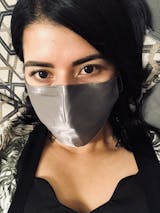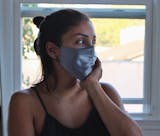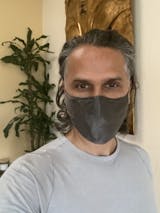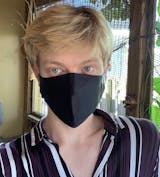How to Treat Maskne: A Quick Guide
Maskne, or acne caused due to face masks, is increasingly common now that we’re all forced to wear face masks for protection. Face masks can cause acne because your pores are blocked by sweat, oil and makeup, and the mask creates a pocket of humidity which is the perfect breeding ground for acne. Friction and irritation caused by the material can also worsen matters.
Acne is a problem that can have deep effects, so it shouldn’t be taken lightly. If you are suffering from maskne, you can breathe a sigh of relief, because we’ve got some tips on how to treat maskne that’ll take care of the problem within just a few weeks.
Fait avec Coeur is here to help
Your first focus in treating maskne should be in the type of mask you’re wearing day in and day out. While you may not have considered a silk mask to be anything more than a fashion statement, think again.
Fait avec Coeur is a sustainable, environmentally-friendly brand that sells silk face masks, pillow cases, bedsheets, and more. One of the reasons why we focus on silk is that apart from being sustainable, it has antimicrobial, anti-inflammatory and hypoallergenic properties that make it wonderful for face masks and bedsheets. These products are made with high-quality silk that soothes your skin and helps it rest.
So when it comes to those with sensitive or acne-prone skin, silk has some wonderful properties that might just make it your new favorite fabric.
How to Treat Maskne: Silk Face masks Help!
Our face masks are made with 100% mulberry silk. It’s the softest silk on Earth (literally), so irritation and breakouts will soon be a thing of the past. Our silk face masks are cool and breathable, so they don’t cause acne. Since we all have to wear a mask, you might as well wear something stylish and fun that won’t cause pimples.
Silk has excellent antibacterial and antifungal properties, which have been tested in various studies. Researchers have found that silk dyed with natural colorants has antimicrobial properties against E. coli, with a reduction rate of 25-65%. Against Aspergillus niger (also called black mold), it had a reduction rate of 3-68%.
Another study conducted in Japan successfully isolated an antibacterial peptide from the silkworm. Since the silkworm is what makes silk strands, it stands to reason that silk will have antibacterial properties as well. In a different study from 2010, scientists were able to extract an antimicrobial protein from silk and apply it to cotton fabric to give the latter antimicrobial properties. This shows you just how effective the antimicrobial properties of silk are – they can be used to make other textiles better!
Thai silk was tested in a study, and researchers found that it was able to stimulate IL-10 production, which has anti-inflammatory and hypoallergenic effects. They concluded that Thai silk fibroin is a promising material for wound dressing – especially in people who are prone to developing allergic reactions.
So as you can see, the proof is in the pudding. Silk has not only antimicrobial, but also anti-inflammatory and hypoallergenic properties. If scientists recommend it for wound dressing, you can imagine the wonders it’d work for maskne!
How to Treat Maskne: More Tips
Other than wearing a high-quality silk face mask, here are some more tips that you should follow for treating maskne. If you don’t have maskne but have acne-prone skin, you should follow these tips to prevent the problem from occurring.
1. Wear a breathable mask
Thick, unbreathable fabrics can worsen the problem by not letting your skin breathe. Get a soft, skin-friendly fabric that doesn’t create a pocket of humidity. Silk and cotton are great examples, although a cotton face mask may cause irritation if it isn’t soft.
2. Wash your mask daily
You need to wear your face mask all day, every day, so make sure you wash it daily to keep it clean. You breathe into it all day long, and it’s attacked by germs on the outside, so it’s important to keep it clean not just to avoid maskne, but also so you’re safe from viruses. (And contrary to popular belief that silk is too delicate a fabric to handle proper washing, our 100% organic silk is durable and able to handle regular machine washing on the gentle cycle – hang to dry)
3. Have a good skincare routine
You need a simple and effective skincare routine that includes cleansing and moisturizing, so the problem is kept under control. Avoid adding active ingredients to your skincare routine – especially strong ones like vitamin C or retinol, because they can cause irritation and lead to breakouts.
4. Invest in a silk pillowcase
Treat yourself by investing in a high-quality silk pillowcase. Our pillowcases are made with soft, luxurious silk that lets your skin relax while you sleep. Your face rubs against your pillowcase all night, and if your pillowcase isn’t soft, sleep can worsen, rather than improving your skin.
5. Eat healthy
What you eat has a direct effect on your body. Avoid eating fried, unhealthy food, and eat lots of fruits and veggies. Consume less sugar and dairy, since they are known to cause inflammation.
6. Consult your doctor
If the problem is severe or long-lasting, you will need to consult your doctor. Acne can have serious underlying causes, so you don’t want to ignore it. If the problem persists despite trying all the tips mentioned above, it may be time to go to a doctor.
In summary, make sure your skin can breathe, keep it free from irritation, and take care of your skin – cleansing and moisturizing, and keeping your mask clean so your skin doesn’t come in contact with germs.
How to Prevent Maskne
Now that you know how to treat maskne, let’s discuss how to prevent the problem, so you can nip it in the bud. Apart from following the tips listed above and wearing a soft silk face mask with antimicrobial properties, here are some more things you can do to prevent maskne:
1. Know your skin type
All skin types can get acne (especially oily or combination skin), but you need to know your skin type in order to take proper care of it. Good skincare can prevent acne from occurring. Products that dry your skin out may not be suitable if you already have dry skin, for instance.
2. Drink plenty of water
When you’re dehydrated, your body signals your skin’s sebaceous glands to produce more oil, which causes acne. So, stay well hydrated by drinking 8 glasses of water daily, and your skin will thank you.
3. Wear less makeup, or opt for lightweight, sensitive-skin makeup
Makeup is a very useful tool, and it helps boost your self-confidence. However, one thing it also does is block pores. And when pores are blocked, pimples rear their ugly heads. So, limit makeup and when you do wear it, try and use products that don’t trigger your acne. Greasy or oily makeup products are big offenders.
4. Don’t pop your pimples
If you aren’t super acne-prone but get the occasional pimple and rush to pop it, you might be setting yourself up for major problems in the long run. Popping pimples can lead to inflammation, and can clog surrounding pores, thus causing more pimples.
5. Stay out of the sun
While you need some sunlight to stay healthy and happy, prolonged exposure to the sun can dry out your skin and cause dehydration, which can trigger your oil glands to produce more oil. Wear a hat or carry an umbrella if you need to walk in the sun on your way to work. And don’t forget a good sunscreen-based face lotion or makeup bases!
This was our guide on how to treat maskne. For more skincare tips and interesting facts about silk, follow our blog! You can view our silk face masks here.
All of Fait avec Coeur's silk products are OEKO-TEX®, BSCI, and ISO certified.
References:
A.K. Prusty, Trupti Das, A. Nayak, N.B. Das, Colourimetric analysis and antimicrobial study of natural dyes and dyed silk, Journal of Cleaner Production, Volume 18, Issues 16–17, 2010.
Hara, Siichi and Yamakawa, Minoru. Moricin, a Novel Type of Antibacterial Peptide Isolated from the Silkworm, Bombyx mori(*). Journal of Biological Chemistry, 1995.
R. Rajendran, C. Balakumar, R. Sivakumar, T. Amruta & N. Devaki, Extraction and application of natural silk protein sericin from Bombyx mori as antimicrobial finish for cotton fabrics, The Journal of The Textile Institute, 2012.
Saviane, A., Romoli, O., Bozzato, A. et al. Intrinsic antimicrobial properties of silk spun by genetically modified silkworm strains. Transgenic Res, 2018.
Bussabong Chancheewa, Supranee Buranapraditkun, Chavee Laomeephol, Pawinee Rerknimitr, Sorada Kanokpanont, Siriporn Damrongsakkul, Jettanong Klaewsongkram,
In vitro immune responses of human peripheral blood mononuclear cells to silk fibroin: IL-10 stimulated anti-inflammatory and hypoallergenic properties,
Materials Today Communications, 2020.










